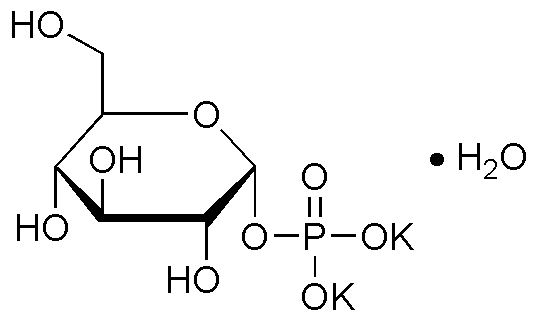|
a-D-Glucose-1-phosphate dipotassium salt hydrate is widely utilized in research focused on:
- Biochemical Research: This compound serves as a vital substrate in studies involving carbohydrate metabolism, helping researchers understand energy production and storage in cells.
- Pharmaceutical Development: It is used in the formulation of drugs that require glucose derivatives, enhancing bioavailability and efficacy in therapeutic applications.
- Food Industry: As a food additive, it can improve the stability and sweetness of products, making it valuable in the formulation of various consumables.
- Plant Biology: This compound aids in studying plant growth and development, particularly in understanding how plants utilize carbohydrates for energy and growth.
- Diagnostics: It is employed in diagnostic assays to measure glucose levels, providing critical information for managing conditions like diabetes.
General Information
Properties
Safety and Regulations
Applications
a-D-Glucose-1-phosphate dipotassium salt hydrate is widely utilized in research focused on:
- Biochemical Research: This compound serves as a vital substrate in studies involving carbohydrate metabolism, helping researchers understand energy production and storage in cells.
- Pharmaceutical Development: It is used in the formulation of drugs that require glucose derivatives, enhancing bioavailability and efficacy in therapeutic applications.
- Food Industry: As a food additive, it can improve the stability and sweetness of products, making it valuable in the formulation of various consumables.
- Plant Biology: This compound aids in studying plant growth and development, particularly in understanding how plants utilize carbohydrates for energy and growth.
- Diagnostics: It is employed in diagnostic assays to measure glucose levels, providing critical information for managing conditions like diabetes.
Documents
Safety Data Sheets (SDS)
The SDS provides comprehensive safety information on handling, storage, and disposal of the product.
Product Specification (PS)
The PS provides a comprehensive breakdown of the product’s properties, including chemical composition, physical state, purity, and storage requirements. It also details acceptable quality ranges and the product's intended applications.
Certificates of Analysis (COA)
Search for Certificates of Analysis (COA) by entering the products Lot Number. Lot and Batch Numbers can be found on a product’s label following the words ‘Lot’ or ‘Batch’.
Numéro de catalogue
Numéro de lot/série
Certificates Of Origin (COO)
This COO confirms the country where the product was manufactured, and also details the materials and components used in it and whether it is derived from natural, synthetic, or other specific sources. This certificate may be required for customs, trade, and regulatory compliance.
Numéro de catalogue
Numéro de lot/série
Safety Data Sheets (SDS)
The SDS provides comprehensive safety information on handling, storage, and disposal of the product.
DownloadProduct Specification (PS)
The PS provides a comprehensive breakdown of the product’s properties, including chemical composition, physical state, purity, and storage requirements. It also details acceptable quality ranges and the product's intended applications.
DownloadCertificates of Analysis (COA)
Search for Certificates of Analysis (COA) by entering the products Lot Number. Lot and Batch Numbers can be found on a product’s label following the words ‘Lot’ or ‘Batch’.
Numéro de catalogue
Numéro de lot/série
Certificates Of Origin (COO)
This COO confirms the country where the product was manufactured, and also details the materials and components used in it and whether it is derived from natural, synthetic, or other specific sources. This certificate may be required for customs, trade, and regulatory compliance.


